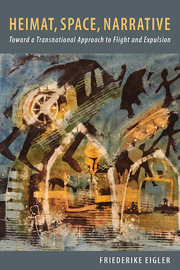Book contents
- Frontmatter
- Dedication
- Contents
- Acknowledgments
- Introduction: Geocritical Approaches to Place-Bound Belonging
- Part I Reassessing the Study of Heimat, Space, and Postwar Expulsion
- Part II Horst Bienek's Novels on Upper Silesia (1975–82)
- Part III Contemporary Novels
- 6 Writing (beyond) Memories of Loss: Novels by Christoph Hein, Reinhard Jirgl, Kathrin Schmidt, and Tanja Dückers
- 7 New Approaches to Flight and Expulsion: Border Regions in Novels by Sabrina Janesch and Olga Tokarczuk
- Conclusion: “Lived Spaces” in Literary Narratives
- Filmography
- Works Cited
- Index
6 - Writing (beyond) Memories of Loss: Novels by Christoph Hein, Reinhard Jirgl, Kathrin Schmidt, and Tanja Dückers
from Part III - Contemporary Novels
Published online by Cambridge University Press: 05 August 2014
- Frontmatter
- Dedication
- Contents
- Acknowledgments
- Introduction: Geocritical Approaches to Place-Bound Belonging
- Part I Reassessing the Study of Heimat, Space, and Postwar Expulsion
- Part II Horst Bienek's Novels on Upper Silesia (1975–82)
- Part III Contemporary Novels
- 6 Writing (beyond) Memories of Loss: Novels by Christoph Hein, Reinhard Jirgl, Kathrin Schmidt, and Tanja Dückers
- 7 New Approaches to Flight and Expulsion: Border Regions in Novels by Sabrina Janesch and Olga Tokarczuk
- Conclusion: “Lived Spaces” in Literary Narratives
- Filmography
- Works Cited
- Index
Summary
The post-unification period has witnessed a renewed interest in twentieth-century German and European history. This interest is no longer shaped by the ideological struggles of the Cold War, yet it is still fraught with conflict. This memory boom, as some have termed it, is marked by a generational shift away from the first generation of witnesses, perpetrators, and victims and toward the second and third generations, the latter of whom are removed from any immediate exposure to the Second World War and its aftermath. The controversial attention to German wartime suffering is part of this preoccupation with twentieth-century German and European history.
As discussed in more detail in chapter 3, some scholars have responded to these developments by insisting on a normative hierarchy within German memory culture, that is, on the primacy of the memory concerning victims of Nazi Germany, in particular memory of the Holocaust (Assmann and Schmitz, among others). Others have welcomed this shift as a broadening of the collective memory culture (Fritzsche and Fuchs, among others). One of the most productive responses to global changes in memory culture—in particular in regard to the Holocaust—is Michael Rothberg's concept of multidirectional memory. Most importantly, it challenges a competitive model of memory, that is, one that adopts a zero-sum approach to cultural memory by assuming that attention to one group of victims is automatically detrimental to the memory of other victim groups.
- Type
- Chapter
- Information
- Heimat, Space, NarrativeToward a Transnational Approach to Flight and Expulsion, pp. 129 - 150Publisher: Boydell & BrewerPrint publication year: 2014



